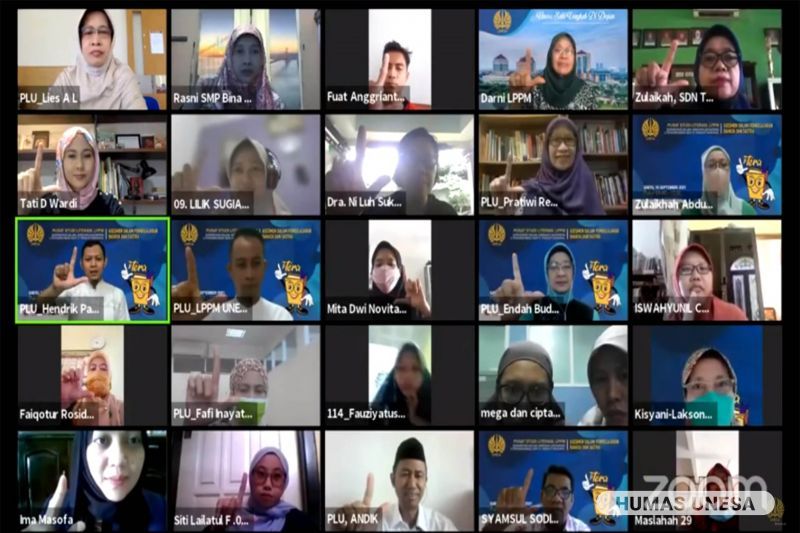
www.unesa.ac.id
Unesa.ac.id, SURABAYA-Center for Literacy Studies, LPPM, UNESA held a series of four National Online Workshops (Sadaring) with the theme 'Assessment in Language and Literature Learning' on Saturday, 18 September 2021. The event was attended by three speakers, namely Lecturer of the Indonesian International Islamic University (UIII) Tati D Wardi Ph.D., and two UNESA FBS Lecturers, Dra. Pratiwi Retnaningdyah, H. Hum., MA, Ph.D and Dr. Syamsul Sodiq M.Pd. They were accompanied by Hendrik Pandu Paksi, S.Pd., M.Pd. UNESA FIP lecturer as moderator.
Head of LPPM UNESA, Prof. Dr. Darni M. Hum., said that assessment is very important to be understood by both teachers and students. Parties involved in learning and learning must be familiar with the AKM assessment models. Teachers should be able to make questions equivalent to AKM, which so far may not have been done. "Through this workshop, I hope you can get enthusiasm and guidance in preparing good and correct assessments, especially in learning Language and Literature," he hoped.
On that occasion, Tati D Wardi Ph.D. describes material about assessment in reading literacy learning. According to him, the assessment is not just a technical process. The assessment is representational and interpretative which involves a representation of the child's development.
There are several main principles of reading literacy assessment that need to be considered. (1) The interests of students are the main consideration in the assessment. (2) The teacher is the most important implementer of the assessment. (3) The main objective of the assessment is to improve teaching and learning. (4) The assessment should recognize and reflect the intellectually and socially complex nature of reading and writing. (5) The assessment process must involve multiple perspectives and data sources, be fair and equitable. (6) Assessment should be based on local school learning communication.
Meanwhile, the basic reading literacy assessment components include (1) the concept of printed writing, (2) identification of letter sounds, (3) frequently used vocabulary, (4) spelling, (5) phonological awareness, and (6) understand reading. "From these components, we can diagnose in ways such as running records or recording students' reading literacy with a piece of paper that we record their progress according to the purpose of the diagnosis," he explained.
Dr. Syamsul Sodiq M.Pd., said that the national assessment provides an overview of the essential characteristics of an effective school in developing student competence and character as a hallmark of good teaching. "So that the school is also highlighted, not only the students," he said.
AKM, he continued, focused on literacy and numeracy due to general and basic competencies. Literacy and language is the ability to understand, use, evaluate, reflect on various types of texts to develop individual capacities as Indonesian citizens and citizens of the world and to be able to make decisions to contribute productively to society.
To develop a language learning assessment, it can be done in various ways, using various literacy strategies or learning strategies, also through habituation to using graphic controllers, or using multi-mode text.
Dra. Pratiwi Retnaningdyah, H. Hum., MA, Ph.D., explained about the function of the role of graphic regulators as a tool for assessment of literary learning. According to him, graphic organizers help to apply metacognitive strategies, organize thoughts so that they are structured, as an informal assessment tool to check students' understanding, and visualize what is in the mind. In addition, graphic controllers can connect previous knowledge with new ones, transfer from short-term to long-term memory, and can solve problems in various subjects.
According to him, AKM is one way to improve the learning process. However, so that children love reading and literature more, they can use methods; developing reading programs in schools, developing literacy assessments at the school level, practicing various literacy strategies in learning, and using various types of texts with varied contexts as learning materials in all subjects (mapel). (Aida/zam)
Share It On:






